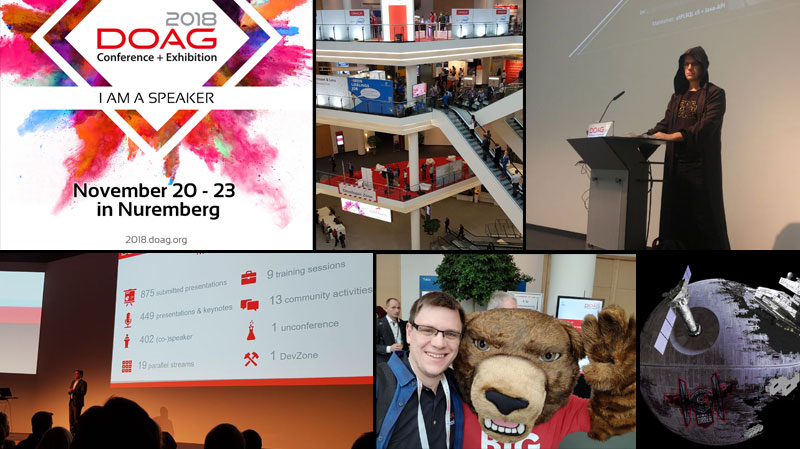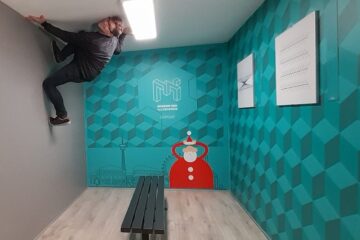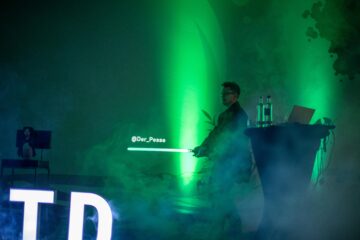
The DOAG exhibition and conference in Nuremberg, 2018 probably the biggest Oracle conference in Europe with over 2000 visitors, is over. And I had the pleasure and privilege to be part of it.
As a first-time attendee and first-time speaker, the conference was both, very exciting and immensely frightening to me. The great location alone with its 4 floors arranged around a huge hall made me question whether I belonged there right when entering. Nonetheless, I proudly got my speaker shirt and the following three days turned out to be one of the greatest highlights 2018 for me.
19 Sessions in parallel every hour made me really spoilt for choice and in the end, I even skipped several slots because of chats with the amazing people I met – and pure exhaustion.
Some of my personal highlights in no particular order:
- Database Driven Machine Learning – Douglas Hood
- The Basics of Machine Learning – Heli Helskyaho
- Oracle SQL Pattern Matching Made Easy – Oren Nakdimon
- Aus der Praxis: Die Reise von Flyway zu Liquibase – Sabine Heimsath
- How to hack your APEX App… (natürlich nur zu Testzwecken) – Anja Hildebrandt
Organization, Food, Location, Transport – all of these things were exceptionally well done and made the conference a great and comfortable experience! Excellent job, DOAG e.V.!
My own talk: Introduction to utPLSQL
The talk before mine finished a bit early so I had even more time to prepare, put on my sith robe, setup my notebook and – OH WHAT THE F**K THIS HDMI CABLE DOESN’T FIT INTO MY NOTEBOOK!! WHAT DO I DO NOW? I NEED THIS CAREFULLY PREPARED DEVICE WITH LIVE DEMO AND…
Luckily it was just a display port adapter still attached to the HDMI cable (sorry to the volunteers who had to deal with me while panicking). Maybe you get my nervousness.
I was very glad some people I already knew from the day before showed up pretty soon and I had someone to talk to – until the doors got closed about 3 minutes before the scheduled start.

The topic struck a nerve, the room was completely full (as was the other talk about utPLSQL by Philipp Salvisberg the next day) and people had to be sent away.
I was very glad I had memorized my talk, so I didn’t need much brain capacity to search for words. And after some minutes it felt much more natural to me (my hands were still shaking pretty much when scrolling through the live demos, but people I spoke with afterward said it was not visible).
I got lots of really great feedback and was even asked if I wanted to do the talk at another conference. Which I might do, because after the first five minutes I really started to enjoy presenting what I had prepared for months.
Tips for first-time speakers
For me, a blog article doesn’t feel right if there is nothing actionable I have to share so I will try to point out some things which were immensely helpful for me – maybe they’ll help or encourage other people who want to do a public presentation.
If you aren’t interested in that, just scroll down to the last and by far the most important part of this blog-post.
Preparation is everything
After my talk I had the pleasure to talk with Douglas Hood – thank you for driving the conversation, by the way, Doug. Made it very easy and comfortable for me!
There was one very important thing he told me:
“If you want to do a great presentation, you are either a genius or you have to put a lot of time and effort in.
I didn’t meet any genius yet in my career.”
To hear this from a top-speaker was very enlightening and also relieving. Meanwhile, I heard the same from several other seasoned speakers. One of them said he calculates 1-2 hours of preparation per minute of the talk.
People who do great presentations aren’t magicians. They aren’t “the chosen ones”, they just invest some serious effort into preparation. They make it look easy because they work hard on their presentations.
If they can do, you can too.
Reduce mental load
Nervousness kicked in about 45 minutes before beginning of my presentation and grew rapidly until I had talked for some minutes. From what I hear and read from other speakers, this tension might not even go away with experience. Nervousness causes stress, which consumes a huge amount of the resources of our brain.
This will probably affect your ability to think, to properly use your IDE and to articulate.
If you expect that to happen you can reduce the mental load you need to do your presentation smoothly:
- Split your talk into chunks and memorize them.
- Practice and identify the transitions between chunks which feel most difficult. Memorize those transitions.
- Don’t change your demo or slides a day before the talk. Not even if you’re impressed by what you’ve already seen and think you should improve. You did well.
- If you are doing a code demo, don’t try to do live coding (not if you’re not used to doing it and practiced it a thousand times. Kudos Philipp again).
- You can use a presentation with code-fragments and animations instead
- You can prepare every step in a large file so you only have to scroll from part to part
- You can use comments to remind you of important things. It will also help the audience.
Practice, practice, practice
Practice alone, practice with friends and co-workers, practice until your talk becomes boring.
Not only will you get very valuable insights from your test-audience, but it will also help you to memorize the talk and let it sink in.
I was very lucky to have great co-workers who spent 45 minutes in the morning before work to sit with me in a meeting room and listen to my talk. I did that for a whole week and it was immensely helpful and gave my slides and storytelling the finishing touch.
The most important part
is to thank all the people who supported me.
My employer Smart Enterprise Solutions, who not only supported me with travel expenses but actively encouraged and bolstered me.
My coworkers and friends who patiently listened even to my first, horrible test-talks.
Several people who encouraged me to even start this adventure.
My wife and kids who were honestly delighted at that possibility for me, though it meant I had less time for them.
But there is one even more important thing:
It was a lot of work to apply, write, prepare, practice and finally do my talk about utPLSQL. But it was never hard.
Because utPLSQL is a wonderful, great project, empowered with the lifeblood of amazing people who spend immense amounts of their spare time to create a tool to help other developers, to make them suffer less.
The real heroes are the contributors of utPLSQL where I myself am only a small candle.
If you have such a great project to talk about, doing a great presentation is so much easier.



0 Comments